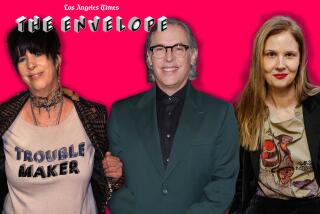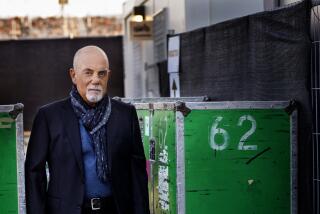Facing Mortality With Mischief Rather Than Tears
- Share via
The dying cancer patient with a dark, dry wit met one of his doctors for breakfast last week and handed over his two most recent CDs, one titled “Life’ll Kill Ya” and the other “My Ride’s Here.” In his familiar baritone, Warren Zevon explained the gifts to the physician: “These are my last two albums. Maybe now you’ll understand that eerie acceptance of death you keep asking me about.”
Zevon chuckled at the account and then paused to catch his breath. Last month, doctors told the 55-year-old musician that he has inoperable cancer in both lungs. The prognosis is bleak, with his time measured in weeks or perhaps months. Zevon is the rocker who defined the volatile edge of the famed singer-songwriter scene of 1970s Los Angeles with his wild, vodka-fueled living and songs of morbid humor, and now he finds himself facing the very unfunny fact of his own mortality.
And, of course, he finds irresistible humor in that.
“Really, the thing I want is to last through the winter so I don’t miss the new James Bond movie,” he said Wednesday by phone from his home in West Hollywood. “And I want to wear sweaters, a scarf, the overcoat, the whole thing, like a Winona Ryder movie. And I can be this miserable, classic Walter Matthau invalid. Not that I haven’t been that before.... “
That sort of riff will come as no surprise to longtime fans of the iconoclastic cult hero, who pals around with sardonic authors Hunter S. Thompson and Carl Hiaasen and tapped David Letterman and Irish poet Paul Muldoon for contributions on his last album.
Zevon’s songbook is packed with bizarre character sketches--prom-date killers, rehab-center divas, jubilant crack dealers, mercenaries, murdered clowns and dangerous dogs--that are for neither the politically correct nor the meek.
Casual pop fans might not be able to name a Zevon record beyond his quirky 1978 horror-show hit “Werewolves of London,” or perhaps “Excitable Boy” and “Lawyers, Guns and Money,” from the same year. But he’s been a fascinating character on the L.A. scene and, like Randy Newman, a master of subversive song craft.
His longtime friend Jackson Browne said Thursday that Zevon’s music is defined by its bravery and candor.
“He is a standard-bearer; he’s very adventurous and there’s a confidence and power that translates to effectiveness,” said Browne, producer of two Zevon albums in the ‘70s. “There’s a literacy, not just of words but also an emotional literacy. The coin of that realm is honesty and vulnerability. But then, you know, there’s a berserk quality to the whole thing when it’s done.”
“Berserk” is a word that was often used to describe Zevon in his younger years. Like gonzo writer Thompson, the Chicago-born musician’s view of an artist’s life was something along the lines of parachuting while drunk and blindfolded.
“He is among the wildest people I’ve ever met,” Browne said. “I always remember him just tearing off into the night in Morocco one time, drunk, by himself. For him, it was all about trials by fire.”
Zevon left that life behind two decades ago, and the singer describes himself now as a better performer, a far superior father and a much-improved driver.
In a grim twist that could fit into one of his songs, in the past year Zevon has been a gym rat (“I was working out more than Vin Diesel,” he says) and assumed that his shortness of breath and the tightness in his chest were side effects of his regimen.
“But then I knew it was bad when the doctor came in with the CAT scan in his hand, closed the door and gave me a glass of water and said, ‘I need to tell you something.’ ”
When Zevon turned to a sober life, he made a public announcement that he did not want to die by drink, which he described as a coward’s death. That was a time before the celebrity mea culpa was fashionable, but Zevon’s proclamation then is similar to his new announcement, via press release on Thursday, about his health. Zevon explained during Wednesday’s interview that he took that approach to define as much as possible the terms of his own life and death.
And what are the terms of the moment? Family and music, he says, as well as watching lots of Steve McQueen movies and shoveling down eggs and bacon. “That’s what I eat. Every meal. It’s fantastic.”
Zevon was married twice but is now single. His adult children, Jordan and Ariel, are in Southern California now, and the singer said he hopes to pack his days with them and maybe even make it out for a fishing trip, one of his beloved pursuits. Next week, though, Zevon plans to be in the recording studio. Long known as a methodical, less-than-prolific artist, Zevon is now in a different gear.
“I’ve been working frantically,” he said. “But you know, imminent doom lowers the bar a bit.”
If the trips to the studio are too taxing, Zevon has at his disposal an elaborate nest of recording gear set up within feet of his bed. “That’s thanks to Danny Goldberg,” he said, a nod to the chief of Zevon’s label, Artemis Records. “He is the absolute best.”
Zevon declined to offer any hints about the new songs, but he said fans should not anticipate material of moist eyes or long, distant stares. “You needn’t look for a great deal more of piety. I have a little mischief in mind.”
Zevon’s career of a dozen albums that began with 1969’s “Wanted: Dead or Alive” is also about to be surveyed in a Rhino Records retrospective titled: “Genius: The Best of Warren Zevon,” which is due in stores Oct. 15.
Zevon has long been praised as a musician’s musician, with Bruce Springsteen, Bob Dylan and Neil Young among those who have proclaimed themselves fans. The child of Russian immigrants (his father was a professional gambler), Zevon was a classically trained child prodigy who found his way to the L.A. canyons in the 1960s in search of a music career. He wrote a song, “She Quit Me,” for the film “Midnight Cowboy,” and made cash with TV jingles, session work and as music director for Everly Brothers tours. As Southern California became a hotbed for singer-songwriters, Zevon was in the scene, but also, he says, a loner with behavior that was not always career-enhancing.
His albums have featured the Eagles, R.E.M. and members of Fleetwood Mac as guest contributors, and Linda Ronstadt memorably recorded his “Poor Poor Pitiful Me.”
But mainstream success has been fleeting. Despite glowing reviews for albums such as “Sentimental Hygiene” in 1987 and “Mr. Bad Example” in 1991, Zevon found himself without a recording contract before Artemis signed him to release “Life’ll Kill Ya” in 2000. Zevon said the path he has walked might have been just right for his strange and singular pace.
“It was a little more interesting this way, maybe,” he said. “Maybe more aggravating, too. At least I’ve had one foot in a very normal kind of life. Nobody does my chores so I can go upstairs and jam with Branford, y’know?
“I feel the opposite of regret. I was the hardest-living rock on my block for a while. I was a malfunctioning rummy for a while and running away for a while. Then for 18 years I was a sober dad of some amazing kids. Hey, I feel like I’ve lived a couple of lives--and now when people listen to the music they’ll say, ‘Hey maybe the guy wasn’t being so morbid after all.’ ”
More to Read
The biggest entertainment stories
Get our big stories about Hollywood, film, television, music, arts, culture and more right in your inbox as soon as they publish.
You may occasionally receive promotional content from the Los Angeles Times.









